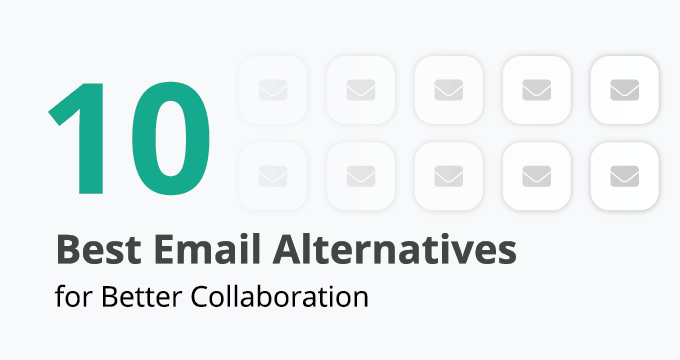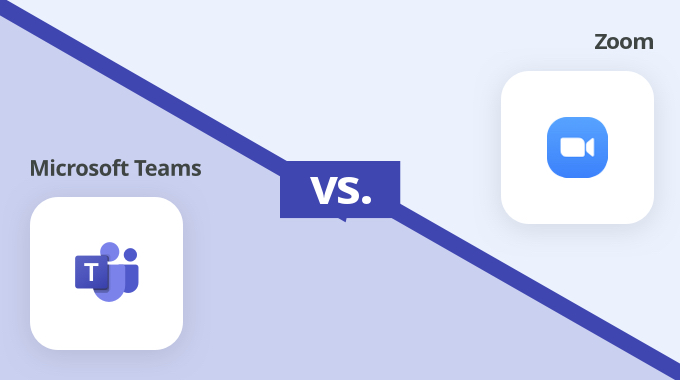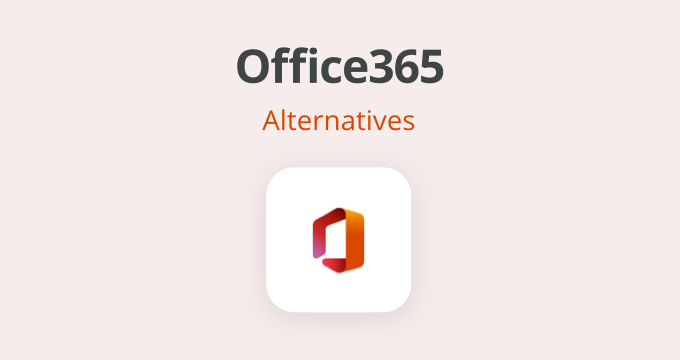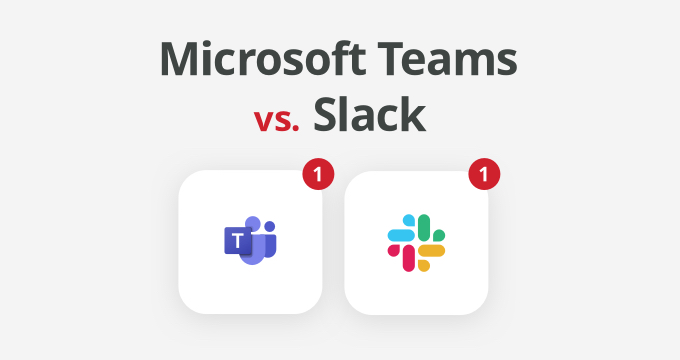Until recently, emails were the only trustworthy channel of business communication. With the rise of remote work, especially post-pandemic, the volume of digital communication sky-rocketed, causing the email to become (almost) an obsolete, heavy-to-use channel. Various collaboration platforms emerged, offering more dynamic, easier-to-navigate email alternatives.
File sharing, instant messaging, and access to audio and video communication became necessary features as the technological advancement of said platforms rose to the task of the more user-friendly digital collaboration.
This article will cover the best email alternatives per our research. Let’s dive in.
Microsoft Teams
Microsoft Teams has seen a staggering rise in subscriptions as a collaboration platform in recent years. It has two significant appeals to companies: it comes as a part of Office 365 plans, so it’s very convenient to integrate with other necessary Microsoft tools, and it has advanced features and a smooth, feature-rich user experience.
As one of the popular email alternatives, Teams offers messaging, video and audio conferencing, document sharing, and even webinar hosting. The pricing plans tend to different needs, with data storage being one of the most appealing Teams features: it offers 1 TB of data per user with all its plans. Another advantage of Teams is its smooth integration to Office 365 other productivity and communication tools, such as Outlook, OneDrive, Calendar, etc.
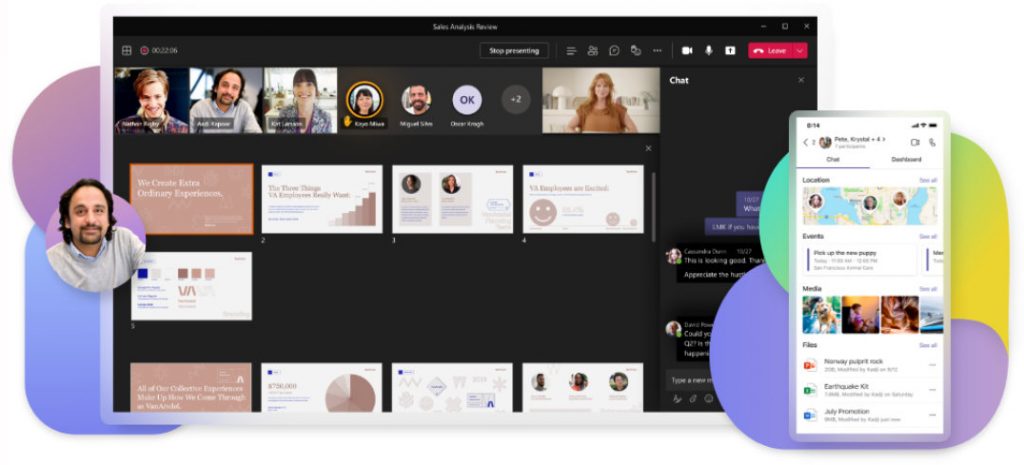
Source: Microsoft
Slack
As Microsoft Teams’ most prominent rival, Slack has earned its reputation by its efficient, structured approach to collaboration.
It offers all-around communication for teams of all sizes due to its conversation-centered approach instead of communication between specific members. In other words, you create channels by creating hashtags, with team members fluidly joining in or leaving. This same feature makes Slack one of the most touted email alternatives.
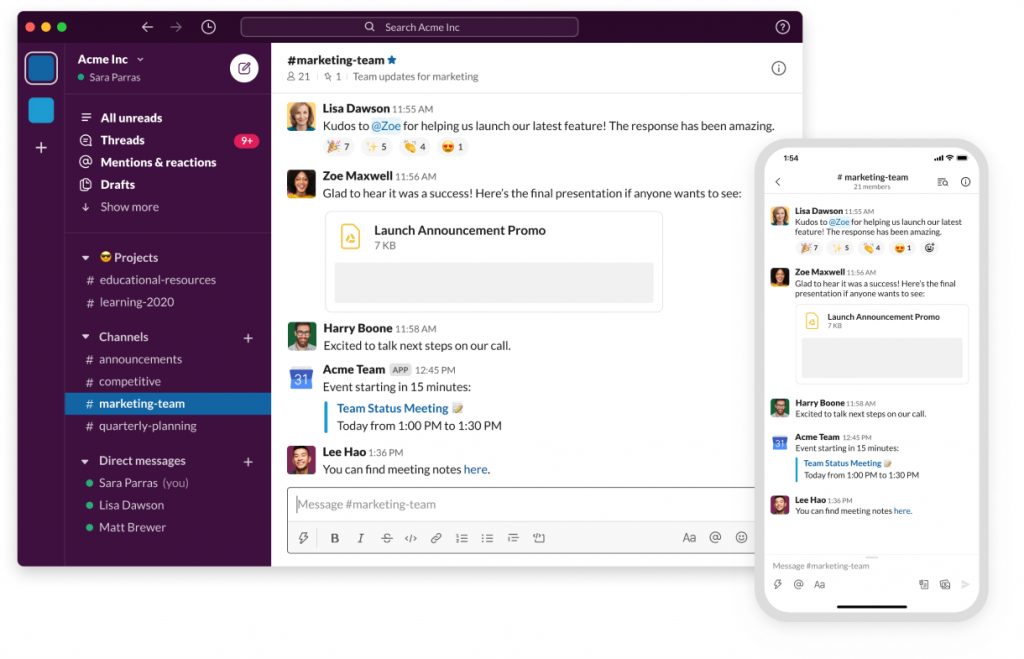
Source: Slack
Besides the redefined streamlined chat, Slack has grown into a comprehensive collaboration tool, equipped with audio and video calls, file sharing, tools integrations for a more efficient workflow, etc.
| Related: Microsoft Teams vs. Slack – Why Choose One or the Other? |
As one of the most popular messaging channels, WhatsApp has found its way into entering and reshaping customer-facing businesses. If your company has any kind of customer service, shifting from email to instant, more direct communication will significantly improve customer satisfaction. Thanks to its immediacy and widespread use, WhatsApp messaging can also help your organization with visibility, boost customer engagement and speed up internal communication among employees.
WhatsApp Business lets you create a customized profile tailored to reflect your brand and products or services you offer. Its appeal lies in the fact that your customers already use it – and by engaging them there, you get a direct gateway to close communication and campaigns. As an alternative to email, it wins in the engagement and efficiency arena.
| Related: Do You Need a Third-Party Solution to Archive WhatsApp? |
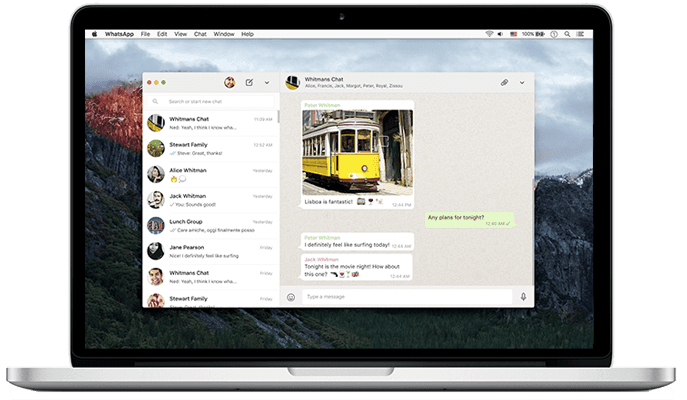
Source: WhatsApp
Google Workspace
Formerly known as G Suite, Google Workspace is Google’s all-around communication and collaboration platform that provides a feature-rich work environment that relies on different apps to deliver a unified collaboration experience.
Although Gmail is part of it, the idea behind Google Workspace is to provide a more agile collaboration via its other apps. For example, Drive is a place to share and exchange data. Google Meet is a tool for video calls, and Chat is designed for quick, efficient messaging, etc.
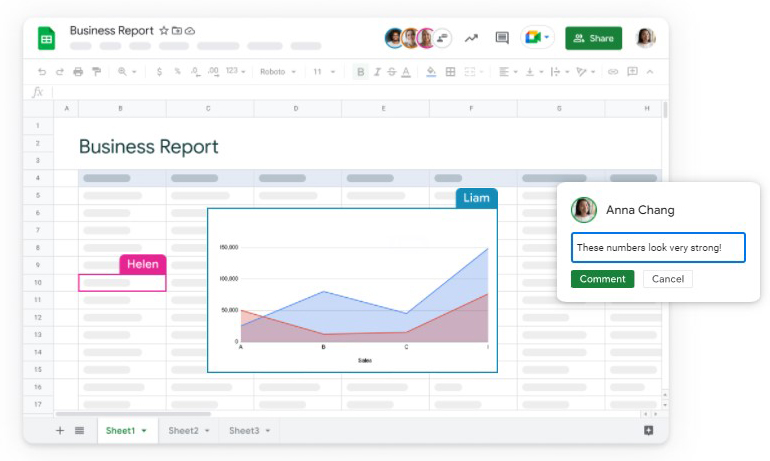
Source: Google Sheets
The primary appeal of Google Workspace is its interface familiarity, and tools that are easy to work with, making it one of the most accessible email alternatives for businesses of all sizes. It has different pricing plans tailored for companies small and large, with a 14-day free trial included.
| Related: Best Google Workspace (G Suite) Alternatives for 2022 |
Yammer
Yammer is another alternative to email with an emphasis on social networking. Microsoft bought it in 2012, and it’s since been offered as a part of Microsoft 365. Yammer is a closed platform available only to employees within the same corporate domain.
Besides its networking appeal, Yammer is designed to increase productivity by providing a more searchable, transparent knowledge base. It lets you enrich the conversations with media – including photos, videos, and docs. More importantly, it allows for creating “communities” where you can search for information and engage with members. It is seamlessly integrated into Microsoft Teams, SharePoint, and Outlook.
With its features, Yammer is especially appealing to large international enterprises that strive for a tight community and transparency culture – overcoming different time zones and anonymity of remote work settings. “Community, knowledge, engagement,” as the Yammer slogan says, creates a solid set as one of the best email alternatives.
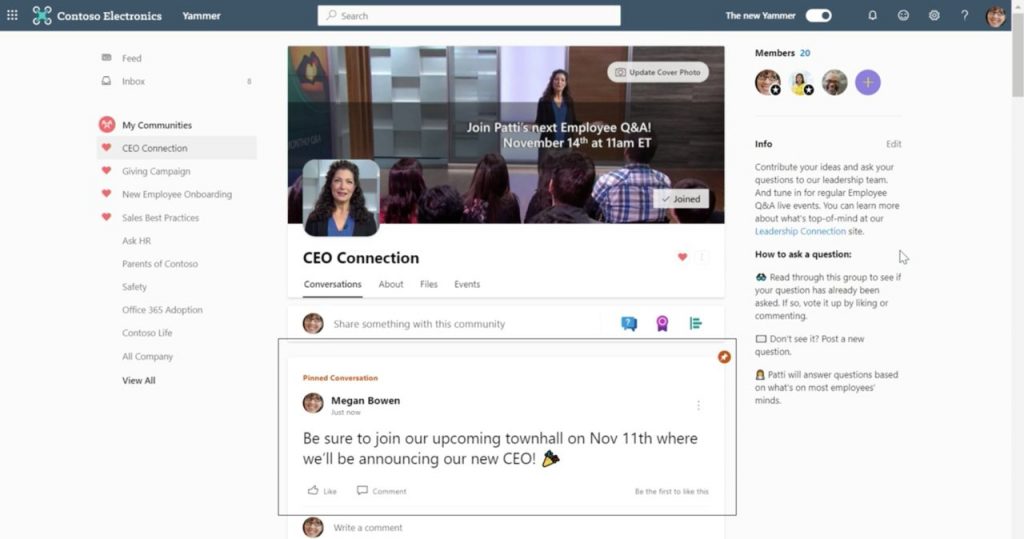
Source: Yammer
Podio
Podio is an online collaboration app owned by Citrix. Besides communication, it provides project management and file-sharing functionalities, which makes it an excellent, customizable email alternative.
With hundreds of apps designed for all types of uses – from HR management, customer relationship management to real estate, it is a versatile platform that consolidates entire business communication into a single hub. It works well for enterprises that need a light CRM and collaboration platform. You can add functionalities and apps from an Apps Market, but you can build your own apps and add them to Podio if you have specific needs.
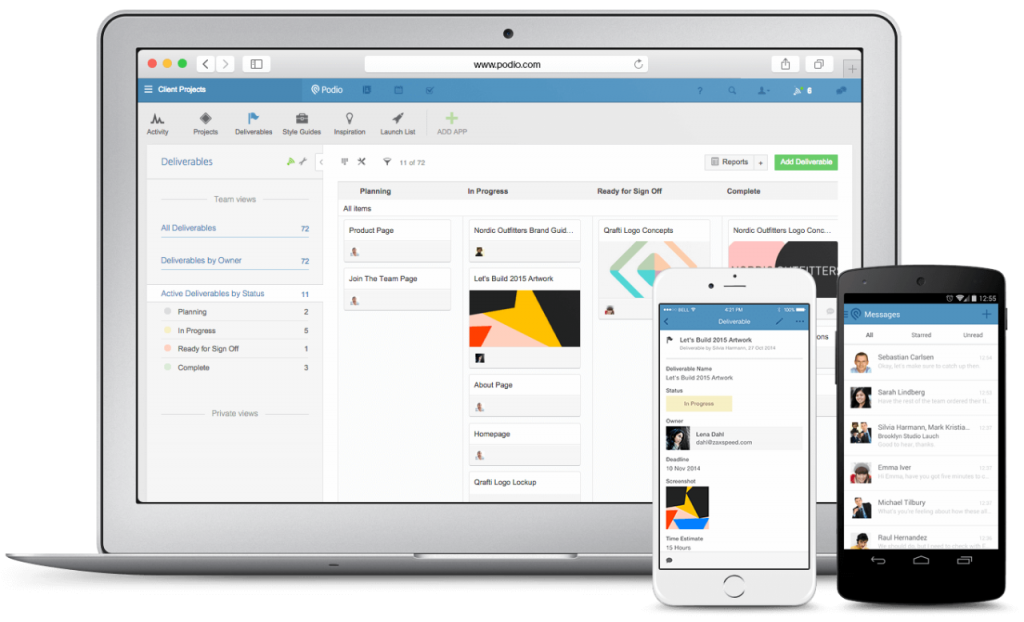
Source: Podio
Groove
Groove is one of the leading sales engagement platforms. A Salesforce native was explicitly designed for sellers who grow and maintain customer relationships. It provides so much more than email – the praised activity capture, accurate reporting and forecasting, reduced compliance risk, and a well-organized, streamlined administration.
Due to its flexibility and organized interface, Groove increases rep productivity and drives Salesforce adoption. Although it has a particular target group, we found Groove one of the best email alternatives for contemporary sales businesses.
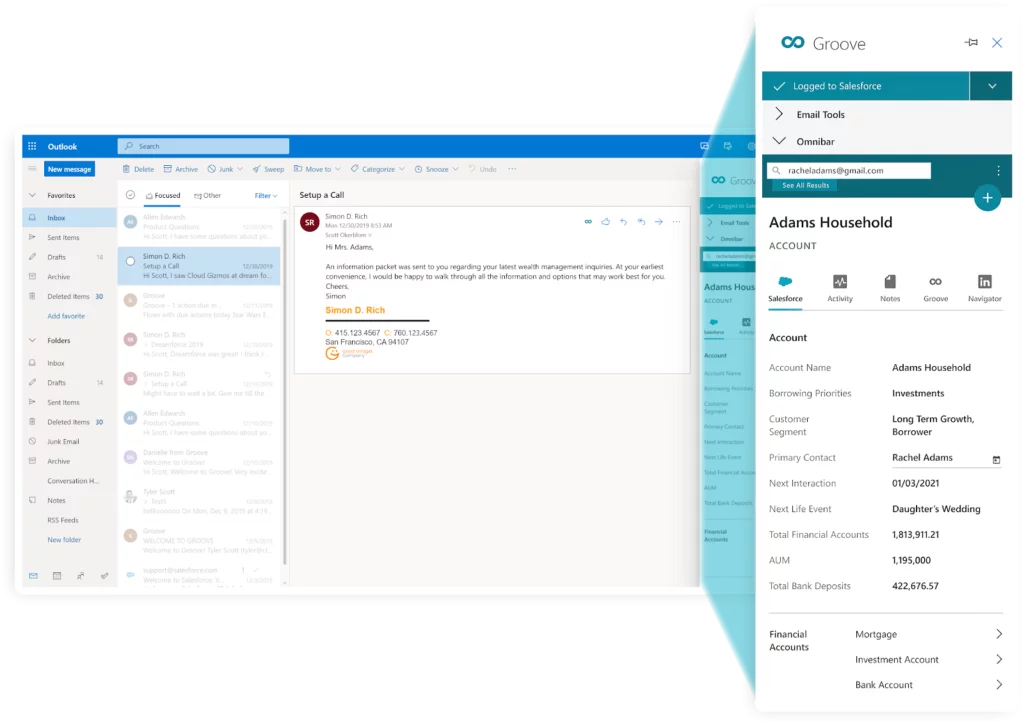
Source: Groove
Asana
Asana is an online collaboration app designed for tracking work. Team members can create different projects under a central location to efficiently allocate tasks, share files, send messages, and track progress.
You can set up Asana as a kanban board for easy progress tracking. For example, you can organize tasks into “to do, in progress, and done” categories. The project management with Asana bypasses the need for email communication, especially as it integrates into Google Drive, Evernote, Dropbox, and more.
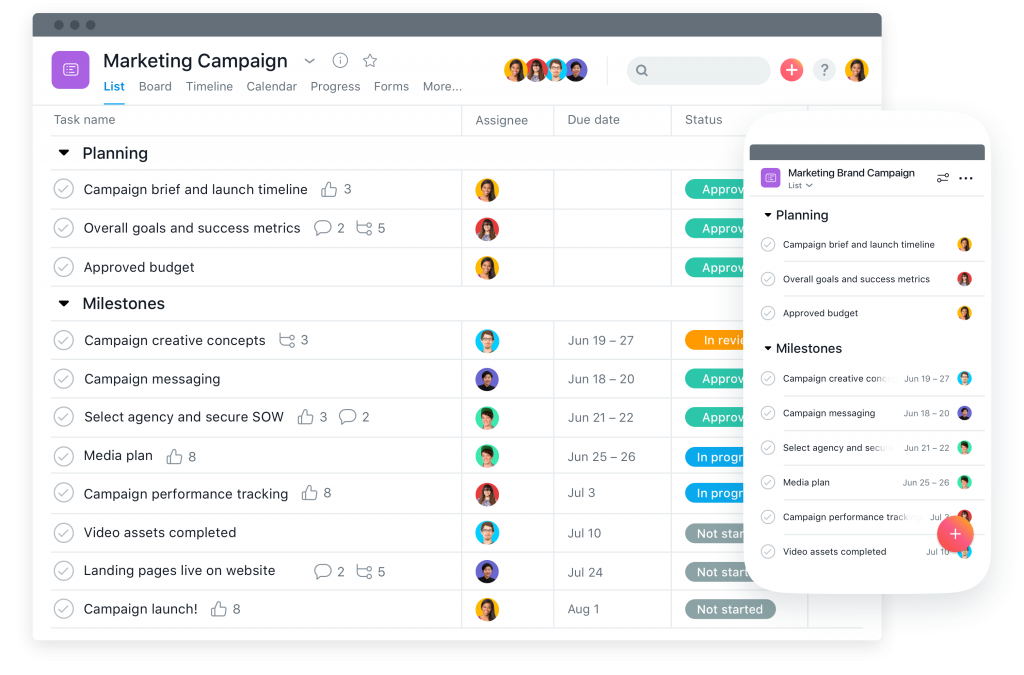
Source: Asana
Basecamp
Basecamp is an online collaboration app designed for managing work and team communication. Instead of endless email back and forth, Basecamp lets people keep track of their tasks, files, and deadlines. Communication is a big part of it, with features for discussion and private messaging (called “pinging” in Basecamp).
Basecamp is particularly suitable for streamlining project work, as it has a Lineup feature that lets you plan, execute, and follow projects – from the type of job to be done to the people involved.
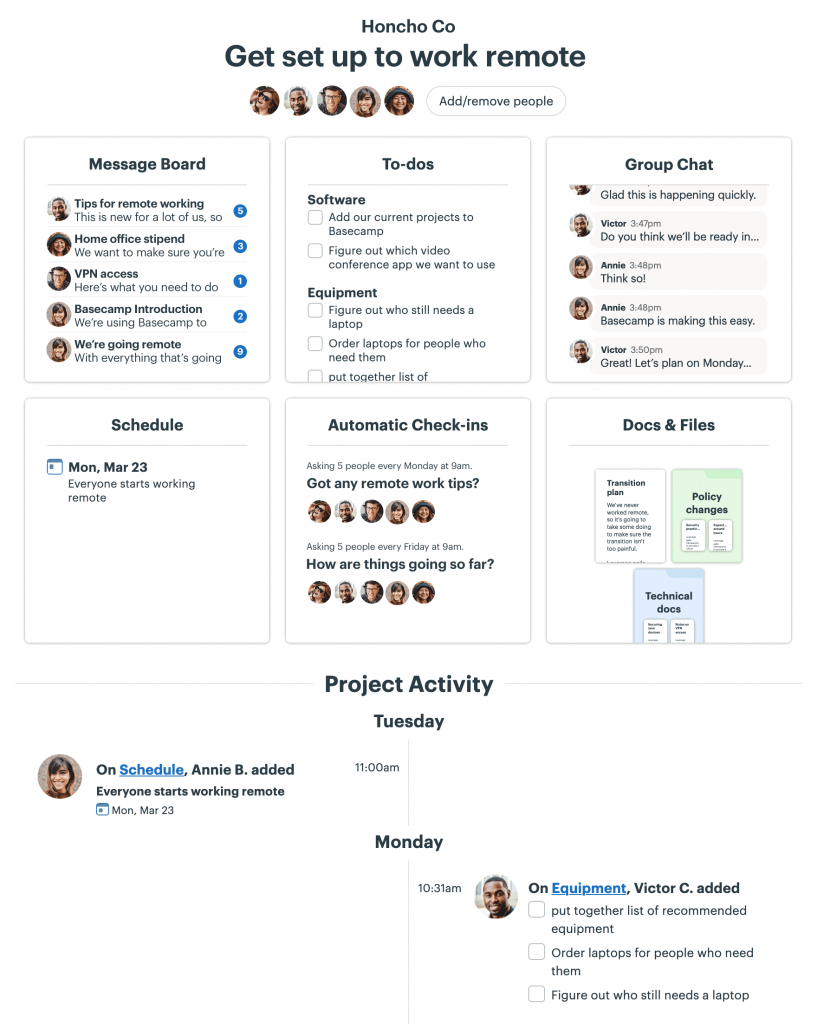
Source: Basecamp
Skype
Skype is a VoIP platform that has revolutionized the way we communicate. Its global popularity rose so much that the verb “skype” has been added to the Merriam-Webster dictionary. As a free alternative to email, Skype offers several features for efficient communication: text, audio and video calls, phone number calls, and file sharing. It provides video conferencing for up to 25 people, with the number going as high as 250 attendants with Skype for Business.
You can also send messages in offline mode – they will be automatically delivered upon connecting to the internet.
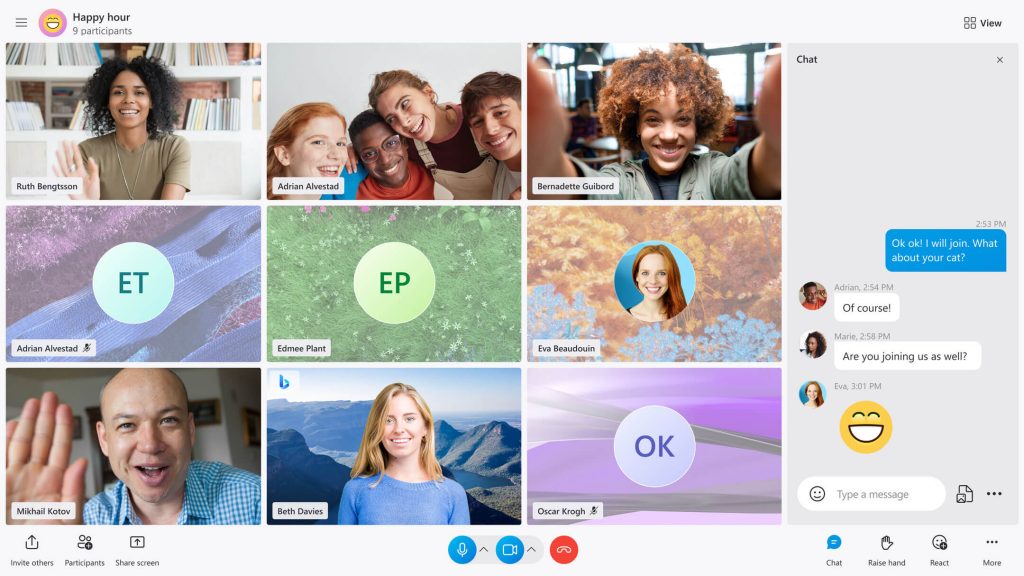
Source: Skype
At Jatheon, we provide robust solutions for on-prem and cloud archiving of all your business communication, including email, social media, Microsoft Teams, Yammer and WhatsApp archiving. Whichever email alternative you choose, attention to proper archiving will ensure your business stability and continuation. Contact us or order a demo to learn more.
Read Next:How Email Works: Email Server Software Secure Email Providers: Everything You Need to Know Zoho vs G Suite (Google Workspace) – A Comprehensive Comparison |
